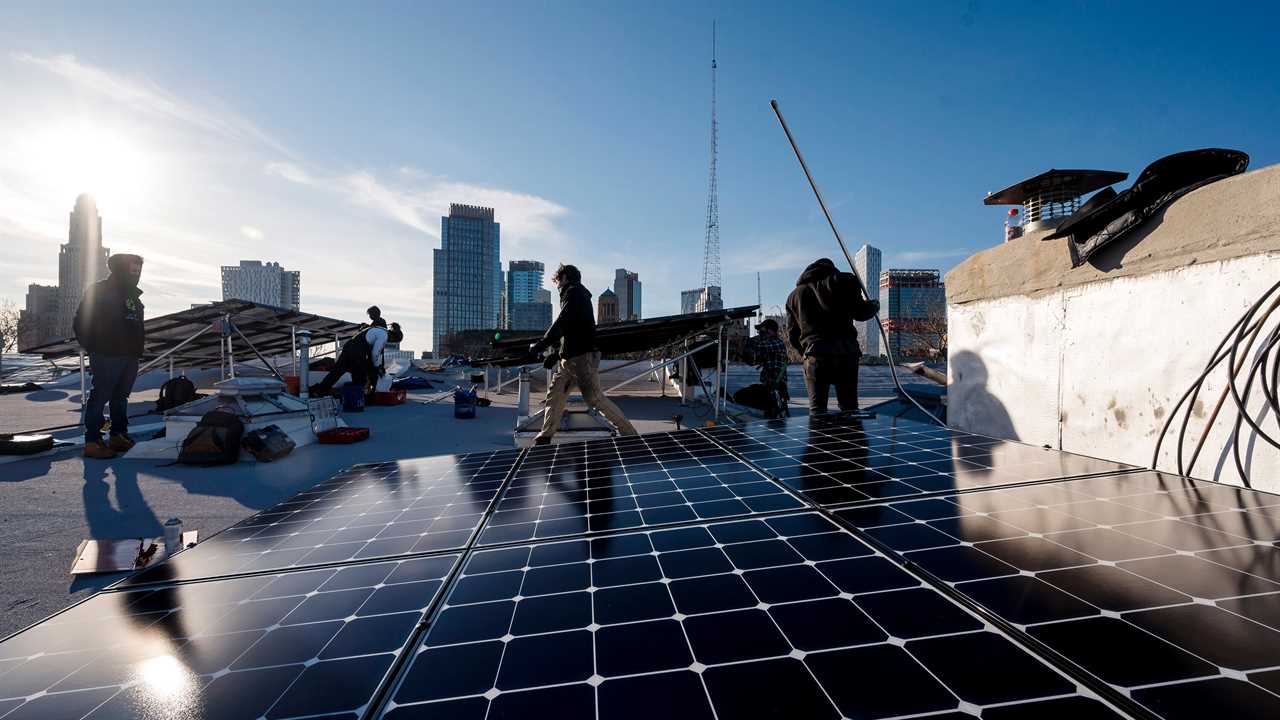
WASHINGTON — In 2017, as Donald J. Trump was announcing the United States’ withdrawal from the Paris climate accord, the largest global effort to attack planetary warming, he declared, “I was elected to represent the citizens of Pittsburgh, not Paris.”
On Wednesday, President Biden traveled to Pittsburgh to try to make the opposite case: that the workers Mr. Trump was appealing to have more to gain from combating climate change than to lose.
It is going to be a tough bet. To Mr. Biden, a $2 trillion infrastructure plan is about creating union jobs, hundreds of thousands of them, in wind and solar power, electric cars and road- and bridge-building. Even those more basic infrastructure projects would have a climate angle: the new roads and bridges would be built to withstand the high waters and brutal storms of a changing climate.
“I am a union guy. I support unions, unions built the middle class. It is about time you start to get a piece of the action,” Mr. Biden said in Pittsburgh.
He promised “good paying jobs” for “American workers” making “American products.”
That is not a new pitch. For decades, Democrats have insisted “jobs versus the environment” is a false choice. But in the scale of his proposal and the audacity of his promises, Mr. Biden may be laying his political future on that idea.
He faces a lot of skepticism.
In Michigan, a state critical to the president’s political future, autoworkers know it takes fewer of them to build an electric car. Senator Joe Manchin III, the West Virginia Democrat whose vote could again decide the package’s fate, understands coal miners in his state would earn considerably less putting up wind turbines.
And in Pennsylvania, which put Mr. Biden over the top in November, and then hosted his speech on Wednesday, some union workers don’t see how skills honed over decades in fossil fuel industries would translate in a clean-energy future.
“They keep saying, ‘We’re going to transition you into solar jobs.’ That’s not how it works,” said Shawn Steffee, a leader of the Boilermakers Local 154 in Pittsburgh. “We build power plants, petrochemical plants and maintain steel mills.”
He asked, “Would you ask Tom Brady to play middle linebacker just because he’s a football player?”
Union leaders — some of whom switched from supporting Mr. Trump in 2016 to Mr. Biden in 2020 — say that for now, they will work with him to realize his vision of conquering climate change, even as it transforms their workplaces.
But they are skeptical that the well-paying union jobs the president promises will materialize, noting that, so far, the ecosystem of manufacturers, contractors and utility developers that has grown up around the green economy has often been low-paying and hostile to unions.
“The president’s new mantra is ‘Build Back Better’ with good union jobs that have good wages, and not just wages but representation,” said Joe Davis, the state political coordinator for the International Brotherhood of Electrical Workers in Michigan. “But these companies seem to be resistant to that.”
And Republicans are ready to try to win back the union votes that Mr. Trump won, then lost. “Rather than picking winners and losers with pie-the-sky Green New Deal mandates, we should be embracing an all-the-above energy strategy,” Representative Cathy McMorris Rodgers, Republican of Washington, said Wednesday.
No industry may have more to gain — or lose — from Mr. Biden’s climate plan than America’s automakers, which currently employ about a million workers. The president’s infrastructure plan proposes $174 billion to encourage the manufacture and purchase of electric cars, which today make up just 2 percent of the vehicles on America’s highways.
He envisions a not-too-distant future in which nearly half of the middle-class drives affordable union-made cars, trucks and sport utility vehicles that produce zero fossil-fuel pollution, powered by millions of electric vehicle charging stations, all jump-started by his stimulus spending.
From a climate perspective, the plan makes sense. Fossil fuel emissions from vehicle tailpipes are the leading cause of planet-warming pollution in United States. Replacing gas-guzzlers on the road with electric vehicles could be one of the most effective ways to lower the nation’s emissions.
From a job-creation perspective, it’s more complicated. On the one hand, it takes about one-third fewer workers to build an electric car than a car with an internal combustion engine. On the other, the plan could make Detroit more competitive and increase its share of the global automobile market.
Mr. Biden’s proposed solution is to lure the electric-battery industry, and its supply chain, to the United States from China and elsewhere in Asia, with a mix of manufacturing tax credits and other incentives. If it works, the next two years would see new electric vehicle battery and assembly plants sprouting up across the country. If it fails, Mr. Biden could face harsh political repercussions.
“We can make it work, but we have to be intentional about policy to bring the battery supply chain back to the U.S.,” said Representative Debbie Dingell, a Democrat whose Detroit-area district is home to some of the nation’s largest auto plants. She added, “If they’re in China and Asia, this isn’t going to be OK.”
Some industry analysts say as Americans buy more electric vehicles, battery manufacturers will build plants in the United States. That would make it easier to integrate the batteries into cars and helps save on transportation costs.
But even with new plants much of the work can happen outside of the United States. According to a recent report by the Center for Strategic and International Studies and BloombergNEF, an energy research group, only 46 percent of the value of a Tesla battery assembled in the United States comes from this country. The rest comes from Japan and China.






